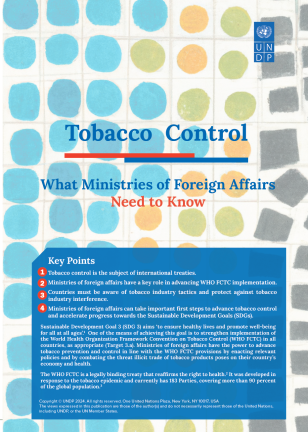Tobacco Control: What Ministries of Foreign Affairs Need to Know

Tobacco Control: What Ministries of Foreign Affairs Need to Know
February 5, 2024
Tobacco kills 8.7 million people every year, including up to half its users in addition to non-users exposed to deadly second-hand smoke. The burden of tobacco reaches far beyond health, weakening the economy, disrupting social systems and damaging the environment. Low- and middle-income countries (LMICs) bear a greater portion of the global burden, with over 80% of tobacco users living in LMICs.
Without adequate investment in tobacco control it is estimated that up to 1 billion people could die from tobacco-related diseases during this century alone.
Urgent and whole-of government action is needed to tackle the tobacco burden, calling for a response from all government sectors. This brief is part of a set of 13 provided by UNDP that map out roles and first steps different parts of government can take to help achieve the SDGs by reducing tobacco use.
Ministries of foreign affairs can take key steps to advance tobacco control and accelerate progress towards the SDGs. This includes ensuring the participation of the ministry in tobacco control multisectoral action plans and coordinating mechanisms, working with national stakeholders and other countries to eliminate illicit trade, and promoting policy coherence. Ministries of foreign affairs also stand to benefit from tobacco control – with 183 Parties to the WHO Framework Convention on Tobacco Control (WHO FCTC), covering more than 90% of the global population, this evidence-based treaty brings nations together to reduce the tobacco burden. This provides opportunity for international relations as representatives of ministries of foreign affairs take part in or lead discussions in sessions of the Conference of the Parties to the WHO FCTC, the Meeting of the Parties to the Protocol or other international meetings.

 Locations
Locations




